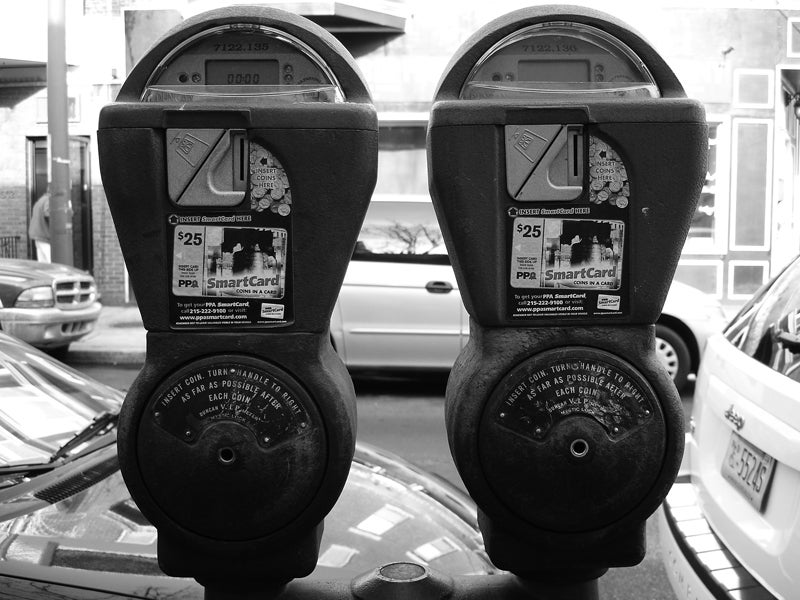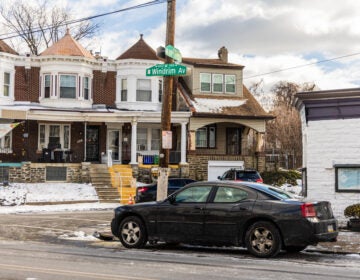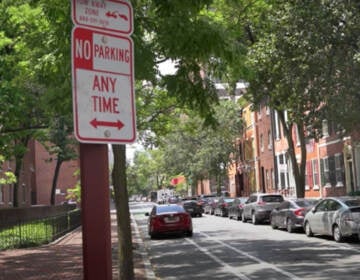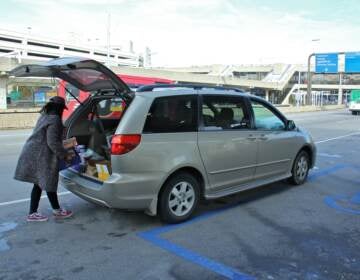PPA Privatization Explainer: Revenue generator or boondoggle?

Senate Majority Leader Jake Corman (R., Centre) raised eyebrows this weekend with a memo to colleagues seeking co-sponsors for a forthcoming bill to privatize the Philadelphia Parking Authority (PPA).
The memo, short on details, simply said the legislation would generate “additional revenue for the sole purpose of increased funding to the Philadelphia School District.”
In an interview with PlanPhilly on Tuesday, PPA Executive Director Vince Fenerty called Corman “misinformed,” adding “I believe this is the best run parking authority in the nation.”
Fenerty also said that he spoke with state representatives to organize opposition to the bill.
Corman’s office did not respond to requests for comment, so we can’t say yet what the bill will propose exactly. But parking privatization isn’t new – a handful of U.S. cities have privatized their parking assets and more still have considered it. So what’s at stake when cities privatize parking and what would the idea mean for Philadelphia?
WHY MAKE THE PUBLIC, PRIVATE?
Privatization of public assets tends to be popular during economic downturns, as state and local governments scramble to raise short-term revenues and investors look for safer investments. As the economy improves, privatization deals tend to lose their luster. In 2014, Molly Ball argued that the privatization movement was now facing a backlash, fueled in large part by Chicago’s disastrous deal with a Morgan Stanley-led consortium that undervalued the city’s parking assets by one to five billion dollars, depending on who you ask.
Since Chicago, Indianapolis has been the only large American city to approve a privatization deal. Chicago received a lump sum payment of $1.2 billion for leasing its 36,000 on-street meters for 75 years. Indianapolis only got $20 million up front, but enjoys a cut of revenues going forward.
In the year before Indianapolis privatized parking, the city only netted $340,000 in parking fee revenues. A few years later, Indianapolis’ share of parking profits broke $3 million.
But even in relatively successful Indianapolis, privatization has had its critics. While the city expects to collect $400 million over the deal’s 50 years, the Indianapolis Business Journal calculated that the private contractor will collect somewhere between $724 million and $1.2 billion.
PRIVATIZING ON-STREET V. OFF-STREET SPOTS
Privatization would mean different things for different PPA assets.
The authority only owns four of the off-street parking lots it runs. It leases two garages from the City and one garage from the National Park Service. PPA gives the net income (revenues minus operating expenses) from these three garages back to the garage owners.
PPA also runs parking at Philadelphia International Airport on behalf of the City, transferring all of the net income to the City’s aviation fund. In Fiscal Year 2015, the aviation fund received $27.8 million.
The General Assembly could simply order the PPA to sell its garages to the highest bidder and stop operating others, without any need for a complex privatization deal. If these were included in a such a deal, it would increase the lease price, but there is no legal reason why a much more direct sale, with lower transaction costs like investment bank fees and legal fees, couldn’t happen.
By contrast, on-street meters and kiosks exist in the public right-of-way. They are part of the streetscape, inherently public land. Because PPA is a government entity created by state legislation, it can own Philadelphia’s 8,850 coin-operated meters and 1,020 multiple space parking kiosks. As long as a street is public, parking on that street implicates the government’s “police power” and thus could not be sold to a private entity. But a lease is a different thing, legally speaking.
Privatization is no stranger to Pennsylvania. During his governorship, Ed Rendell proposed privatizing the Pennsylvania Turnpike. In Pittsburgh, former Mayor Luke Ravenstahl wanted to lease the Steel City’s meters to plug a pension hole – city council there balked after consultants recommended against the deal. Harrisburg leased its 7,733 off-street and 1,250 on-street meters in 2013, using the $283 million to help pay down the bankrupt city’s debts.
In Philadelphia, City Council President Darrell Clarke even considered privatizing parking back in 2011; a few years later, he would receive the lionshare of the credit, or blame, for defeating Mayor Michael Nutter’s plan to sell the city-owned Philadelphia Gas Works.
Most parking privatization deals resemble a complicated loan backed by the parking assets’ revenue streams. In theory, the private operator can operate the assets more efficiently, which means more profits, making privatization seem more lucrative than a straight-forward secured loan.
Usually, privatization deals result in a large, one-time payment to the government entity, perfect for fixing pension gaps, paying down debt, or financing construction projects.
But Philadelphia’s schools need recurring operating funds, not a one-time capital infusion. The last time the District received non-recurring capital funds – $335 million over two years in the form of federal stimulus dollars – then-Superintendent Arlene Ackerman used the money to hire teachers and expand programs, as operations funds. When those stimulus funds dried up in 2011, the School District suddenly saw a huge shortfall. Combined with Governor Tom Corbett’s education spending cuts, this spending dropped Philly’s schools into the underfunded morass it struggles to free itself from today.
Given the School District’s ongoing funding shortfalls, it seems likely that Corman’s legislation would encourage a revenue-sharing model like the one used in Indianapolis.
IS THE PPA RIPE FOR PRIVATIZATION?
In any privatization deal, the “concessionaire” – the private company that leases and operates the public asset – turns a profit by running the meters more efficiently, increasing parking enforcement, and by raising rates. In order for a parking privatization deal to work, a private company needs to reasonably believe it could boost enforcement, improve efficiency, or raise rates. In Chicago, Indianapolis and Harrisburg, the concessionaires managed all three. But pulling off that trifecta in Philly seems less likely.
Could a private concessionaire enforce parking regulations more effectively than the PPA? The Authority that issued about 1.5 million tickets in 2014? The Authority that half of the Daily News’ columnists have made a career out of publically shaming for overzealous enforcement practices? The Authority with enforcement practices so notoriously rabid, A&E made a reality TV show about it?
Enforcement is not PPA’s weak spot.
With regards to administrative efficiency, PPA could run leaner. The authority spent $25.7 million in administrative expenses last year. It’s been accused of overpaying its top executives. The PPA’s Board Chairman, Joe Ashdale, makes $75,000 a year; most government entity directors – even chairmen—receive small stipends or nothing at all for their few hours a month of service. And the PPA sits on a huge cash and cash equivalent cushion: $49.6 million last year.
But a comparison to Indianapolis is telling. Indianapolis, remember, barely made money on parking before privatization. That’s simply not the case here. The PPA is a cash cow.
By law, all of the PPA’s net income from on-street parking goes to the City of Philadelphia and the School District. In fiscal year 2015, that totaled $36.6 million and $11 million respectively. Add in net income from PHL parking, operating the City’s lot underneath Independence Mall and the PPA helped fund local government to the tune of $76.4 million last year.
After those statutorily mandated expenses, other operating costs and depreciation, PPA still saw an operating income of $6.2 million in fiscal year 2015. While it’s perfectly reasonable to argue those additional profits should go to the schools, that has nothing to do with privatization.
In Chicago, Harrisburg, and Indianapolis, the concessionaires all improved operational efficiency by replacing coin-operated meters with new kiosks covering multiple spots. The kiosks notify enforcement officers when tickets expire and also stop parkers from getting lucky and finding a spot where the previous occupant still had time on the meter.
The PPA’s already replaced meters with kiosks throughout Center City and University City. And just last month, the Authority introduced its pay-by-mobile app, further diminishing the potential for operational efficiencies.
That leaves rate increases and hidden costs as a way of improving the parking assets’ profit margins.
The agreements governing the lease of on-street parking tend to shift hidden costs, requiring local agencies to cover costs or lost revenues from various “Compensation Events” – want to shut down a metered street for a block party, or to fix a utility line? Better pay up.
In a privatization deal, city and state officials effectively surrender authority to a private company over all things parking related: the creation of new spots, the removal of old ones, parking permit regulations, and maybe even improvements to the mass transit system.
These concessionaire agreements also usually require the city government to agree to fixed parking rate increases, usually in the form of an ordinance scheduling regular rate increases.
The exact terms of what would or wouldn’t constitute a “Compensation Event” would be stated in the Request for Proposals drafted by whatever government agency Corman’s bill would task with overseeing this privatization deal. That RFP could provide less favorable terms to the concessionaire, but at a cost: less control would lower bid amounts and even discourage private operators from submitting a bid to begin with.
In Philadelphia, City Council sets parking rates and makes parking laws. After a privatization deal, any rate changes not baked into the concessionaire agreement would likely breach the contract, resulting in liquidated damages or protracted lawsuits.
Parking rate hikes aren’t popular. In Indianapolis and Chicago, rate increases infuriated drivers and angered local businesses. A PennLive editorial called Harrisburg’s privatized parking system, “an unnecessarily confusing and frustrating mess that threatens the city’s economic recovery.”
Not everyone hates the idea of increasing parking rates, though. The cost of driving includes the cost of parking. Cheap parking incentives more people to drive, rather than walk, bike or take public transit. It means more cars choking the city’s roads and air. As UCLA’s Donald Shoup argues in the High Cost of Free Parking, low rates encourage bad parking behaviors: circling blocks endlessly to find a free spot and parking all day in front of a retail business. Both add to traffic congestion and hurt vehicle turnover.
And the PPA says vehicle turnover, not making money, is the Authority’s real mission.
“Our primary goal is not to raise money for the school district,” says PPA Executive Director Vince Fenerty. “It is parking turnover, and making sure that an urban business area thrives.”
A privatization deal would provide Council some political cover from drivers’ flak over increased rate, but not by much. Without locked-in, large rate increases, though, potential concessionaire’s would only offer low bids.
On top of all that, any privatization deal would accelerate the PPA’s debt, requiring the immediate repayment of the nearly $160 million in tax-free bonds sitting on the PPA’s books. That amount would be effectively skimmed off the top of any concessionaire agreement.
WHYY is your source for fact-based, in-depth journalism and information. As a nonprofit organization, we rely on financial support from readers like you. Please give today.






